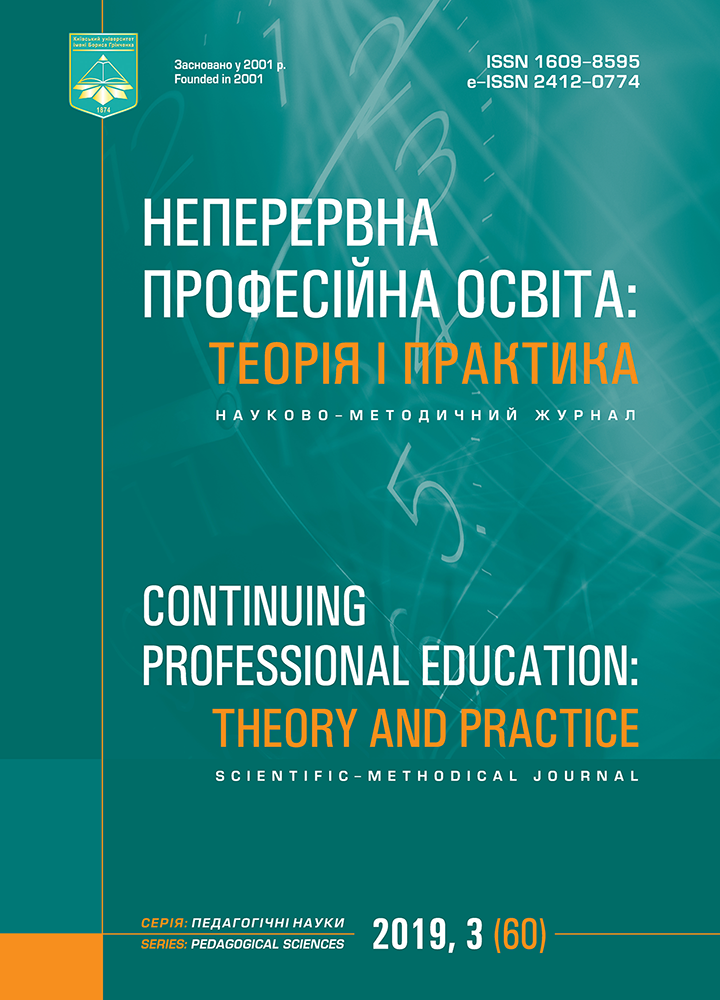PEDAGOGICAL COMPETENCE OF A TEACHER OF PSYCHOLOGY AT A HIGHER SCHOOL: STRUCTURE AND FORMATION CRITERIA
DOI:
https://doi.org/10.28925/1609-8595.2019.3.2228Keywords:
competence, pedagogical competence, pedagogical competence of the teacher, pedagogical competence of the teacher of psychology, structure pedagogical competence of the teacher of psychology.Abstract
The article substantiates the relevance of the study of the pedagogical competence of a teacher of psychology at a higher school and its structure. The scientific approaches to determining the pedagogical competence of a teacher of psychology have been analysed. The article reflects the essence of the pedagogical competence of a teacher of psychology at a higher school within the limits of the competency-based approach, according to which pedagogical competence of a teacher of psychology is the formed result of psychological and pedagogical training of a future teacher and is his professionalism component.
Pedagogical competence of a teacher of psychology at a higher school is determined as a personality and professional characteristic, which consists in a high professional psychological and pedagogical preparation, his or her suitability for teaching activities in the field of psychology, a high level of professionalism of a teacher and psychologist, the presence of a number of personality traits necessary for the effective implementation of pedagogical activities. As a result of the analysis of scientific sources, the components of the pedagogical competence of a teacher of psychology at a higher school have been substantiated, generalized and systematized, namely: value-motivational, personality, professional and vocational, scientific and research, methodological, information and technological, creative. For each of these components there have been substantiated necessary skills and qualities of teachers of psychology. The article also defines and substantiates five criteria for the formation of the pedagogical competence of a teacher of psychology at a higher education institution, namely: value-motivational; personality; intellectual; self-realization. For each of these criteria the formation indicators have been determined. The formation of each criterion should be evaluated at three levels - high, medium and low, each of which corresponds to the presence of these or those indicators.
References
Adolf, V. A. (1998). Formirovanie professionalnoj kompetentnosti budushogo uchitelya [Formation of professional competence of the future teacher]. Pedagogika, 1, 72–75 (rus).
Danilova, L. Yu. (2007). Formirovanie polikulturnoj kompetentnosti studentov [Formation of multicultural competence of students]. Uchitel, 3, 12–15 (rus).
Goncharenko, S. U., Nichkalo, N. G., Petrenko, V. L., Kostogriz, S. G., Zіnkovsky, Yu. F. (2002). Derzhavni standarti profesijnoyi osviti: teoriya i metodika: Monografiya [Powers of standard of professional education: theory and methodology: Monograph]. Khmelnitsky, Ukraine: TUP (ukr).
Yesareva, Z. F. (1974). Osobennosti deyatelnosti prepodavatelya vysshej shkoly [Features of the activities of a teacher of higher education]. Leningrad, Russia: LGU (rus).
Zakon Ukrainy «Pro osvitu» [The Law of Ukraine On Education] (2017). Retrieved from https://zakon.rada.gov.ua/ laws/show/2145-19 (ukr).
Zvarich, I. M. (2011). Pedagogichna kompetentnist i kompetenciya vikladachiv vishih navchalnih zakladiv [Pedagogical competence and competency of the main mortgages]. Molod i rinok, 2, 17–22 (ukr).
Seer, E. F. (2003). Psihologiya professionalnogo obrazovaniya [Psychology of vocational education]. Moskow, Russia: MPSI; Voronezh, Russia: MODEK (rus).
Banashko, L. V., Sevastyanova, O. M., Krishchuk, B. S., Tafіntseva, S. І. Koncepciya pedagogichnoyi kompetentnosti majbutnih uchiteliv u sistemi stupenevoyi pidgotovki specialistiv pochatkovoyi lanki osviti [The concept of pedagogical competence of maybut teachers in the system of step-by-step training of special students on the cob of education]. Retrieved from http://www.kgpa.km.ua/?q=node/233 (ukr).
Kotova, N. V. (2015). Sutnist i struktura pedagogichnoyi kompetentnosti majbutnogo vchitelya pochatkovoyi [The essence and structure of pedagogical competence of the future elementary school teacher]. Mizhnarodnij naukovij zhurnal Naukovij oglyad , 3 ( 13). Retrieved from https://naukajournal.org/index.php/naukajournal/article/view/436/614 (ukr).
Kuzmina, N. V. (1961). Formirovanie pedagogicheskih sposobnostej [Formation of pedagogical abilities]. Leningrad, Russia: LGU (rus).
Kuchinska, I. O. (2018). Pedagogichna kompetentnist suchasnogo vikladacha vishu: prioritetni oriyentiri j perspektivi [Pedagogical competence of the present teacher of visu: priority and perspective prospects]. Visnik Kam’yanec-Podilskogo nacionalnogo universitetu imeni Ivana Ogiyenka, 11 (ukr).
Leontyev, D. A. (1992). Metodika izucheniya cennostnyh orientacii [Methodology of the study of value orientations]. Moscow, Russia: Smysl (rus).
Mangutov, I. C., Umansky, L. І. (1995). Organizator i organizatorskaya deyatelnost [Organizer and Organizer activity]. Leningrad, Russia: LGU (rus).
Markova, A. K. (1996). Psihologiya professionalizma [Psychology of professionalism]. Moskow, Russia: Mezhdunarodnyj gumanitarnyj fond Znanie (rus).
Matsuk, L. O. (2016). Pedagogichna kompetentnist yak chinnik profesijnoyi diyalnosti ta majsternosti pedagoga [Pedagogical competence as an official of professional professionalism and teacher’s mastery]. Osvіtnіy prostіr Ukrainy, 7, 82–87(ukr).
Machinska, N. І. (2012). Obgruntuvannya strukturi pedagogichnoyi kompetentnosti magistrantiv vishih navchalnih zakladiv nepedagogichnogo profilyu [Explanation of the structure of pedagogical competence of graduates of higher primary mortgages of non-pedagogical profile]. Pedagogika i psihologiya profesijnoyi osviti, 6, 18–25 (ukr).
Nagorna, N. V. (2007). Formuvannya u studentiv ponyat kompetentnosti j kompetenciyi [Formation of students’ concepts of competence and competence]. Vihovannya i kultura, 1–2 (11–12), 266–268 (ukr).
Stepanov, S. Yu., Polishchuk, O. A. (1995). Refleksivnaya kompetentnost kak bazovaya kategoriya perdprinimatelskoj deyatelnosti [Reflexive competence as the basic category of entrepreneurial activity]. Refleksiya, obrazovanie i intellektualnye innovacii, 266–271 (rus).
Tevkun, V. V. (2014). Zdorov’yazberezhuvalni kompetenciyi – osnova profesijnoyi pidgotovki majbutnih vchiteliv fizichnoyi kulturi [Health and safety competencies – the basis of professional training for students of physical culture]. Visnik Chernigivskogo nacionalnogo pedagogichnogo universitetu. Seriya: Pedagogichni nauki, 115, 227– 230. Retrieved from http://nbuv.gov.ua/UJRN/VchdpuP_2014_115_60 (ukr).
Shevchuk, T. Е. (2018). Gromadyanska kompetentnist yak element formuvannya osobistosti majbutnih fahivciv [Civic competence as an element of forming the personality of future professionals]. Molodij vchenij, 4.1, 85–88 (ukr).
Scheglova, E. M. (2005). Razvitie polikulturnoj kompetentnosti budushih specialistov: dis. ... cand. ped. nauk: 13.00.08 [Development of multicultural competence of future specialists: Candidate’s thesis: 13.00.08. Omsk, Russia (rus).
Downloads
How to Cite
Issue
Section
License
Copyright (c) 2020 Olga Cherepekhina

This work is licensed under a Creative Commons Attribution-NonCommercial 3.0 Unported License.



